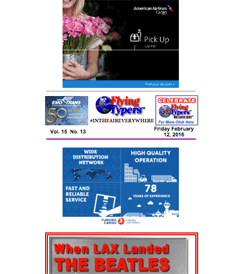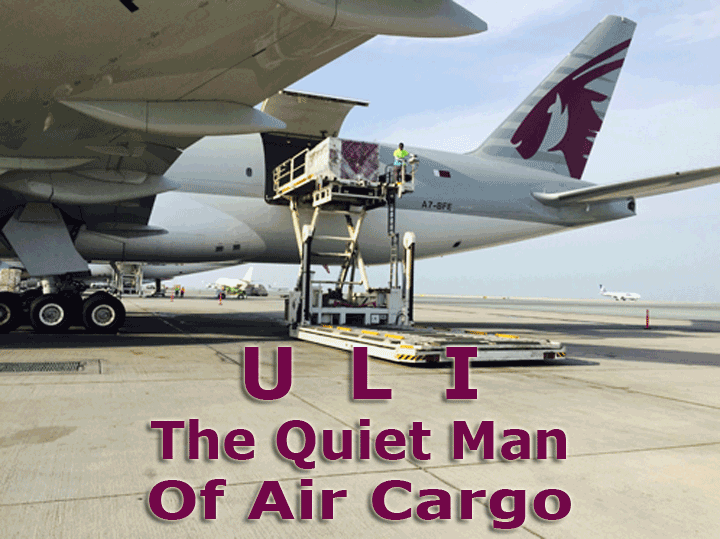
“Speak
softly and carry a big stick,” said Theodore
Roosevelt, arguably one of the greatest presidents
in United States history.
We were thinking about
TR while watching Uli Ogiermann as he sat mostly silent
at an October press conference at Qatar Airways in
Doha. His repose continued later at the meeting room
table while Qatar Airways Group Chief Executive, His
Excellency Mr. Akbar Al Baker fielded reporters’
questions.
A decent and thoughtful
man, Uli’s “big stick” is that he
is, in reality, one of the real heavyweights in the
international air cargo business. Smart and straightforward,
he is the real deal out on the line and up in the
boardroom, where he prefers to let action replace
words. He leads by example, is inspiring by actions
taken.
Uli has served this
business for most of his life, in many capacities,
and for its betterment: for a period of time, he was
president of The International Air Cargo Association
(TIACA) and was a major driver of the organization’s
rapid growth and influence during the last decade
of the 20th century.
In 2015 as Vice President
Cargo at Qatar Airways Cargo, Uli literally has a
tiger by the tail as the airline from Doha by any
measure is a wunderkind of aviation that has witnessed
the rapid rise of carriers nobody ever heard of before
2000 from gateways even lesser known.
In 2015 as Vice President
Cargo at Qatar Airways, Uli has a tiger by the tail.
Qatar Airways is a wunderkind of aviation, emerging
from an area of the world that has witnessed the rapid
rise of obscure carriers from gateways even lesser
known.
As top executive of
one of the fastest growing air cargo businesses in
the world, one might expect Uli would have had more
to say at October’s meeting, but the room was
small and oxygen was in short supply, so he just sat
smiling as “The Chief,” His Excellency
Al Baker, handled the reporters.
As we sat face to face
at the table and The Chief spoke, occasionally I would
look at Uli and catch a broad smile on his face. He
was someone in the moment and loving every second
of it.
It was the first big
press conference Qatar Cargo had ever hosted.
It might have been a
coming-out party of sorts for the Doha air cargo enterprise,
but what Qatar brought to the festivities sure looked
and sounded like a winner.
Later we caught up with
Uli, who has such a kind and expressive face that
mirrors exactly what he is thinking. He was still
smiling as he openly shared the steps that had been
taken to propel the Qatar Airways Cargo enterprise
during the past three years and the express-rocket
ride to the top in international FTKs.
“Qatar Cargo is
where it is today through commitment and vision—according
to the latest IATA international FTK figures, we are
now the third largest international cargo airline
in the world.
“This is phenomenal
growth considering just five years ago we were only
in 16th place.
“With new aircraft
joining our fleet and new destinations launching in
the near future, we are committed to continuing our
growth and expansion.
“By 2017, we will
have 21 aircraft in our dedicated cargo fleet, and
our passenger fleet is predicted to grow to 200 aircraft
by the end of 2016.
“The launch of
new passenger destinations will also increase our
belly hold capacity to cities such as Durban, which
will be flown by a B787, and Sydney, which will be
flown by a B777, both giving 40 tonnes of additional
cargo space.”
Building
For Tomorrow
“To support our
growth, we recently announced that we will be constructing
a second Cargo Terminal, which is set to open in 2018
and will more than double the capacity of our current
operation at the hub in Doha.
“At Qatar Airways
Cargo we maintain a high level of flexibility so that
we can adapt to market trends and fluctuations, and
there is always room for partnerships to reach those
places where we don’t fly in order to optimize
our network.
“We are also committed
to investing in improved technology, which will result
in cost savings that we will pass on to clients.”
Trained
For This Moment In Time
Uli Ogiermann studied
economics in Frankfurt and holds a doctorate in economics
from Goethe-University, Frankfurt.
“I started in
aviation with the Lufthansa Group at Lufthansa Cargo.
“Thereafter, I
worked for Cargolux where I held the position of president
and CEO before joining Qatar Airways Cargo in 2012.”
Getting
Into The Mix
“At Qatar Airways
Cargo 86 percent of our traffic is transit and freedom,
13 percent is imports into Doha, and 1 percent is
exports from Doha.”
“For high-value
goods, fashion, pharmaceuticals, urgent shipments,
and time-sensitive cargo, air is still the preferred
choice of transport.
“When it comes
to speed, reliability, and maintaining lean production
lines, air cargo wins hands down.
“For customers
who are more flexible with their delivery deadline,
ocean freight can be an option,” Uli said.
Partners
Are Key
“Freight forwarders
and agents play an important role in our sales and
marketing planning. To attract new customers and retain
the existing ones, our customers need to know who
we are, what we do, and why they should choose us
over another carrier; forwarders and agents play a
key role in disseminating that message. The forwarders
are our partners and we work closely with them to
develop the best relationship for each of our segments.
We maintain close relationships with our partners
and we identify those with which we see the potential
for growth on both sides.
“Those shippers
backed by a strong freight forwarder will get proper
advice on the best modes of transport for their business,
while those with smaller forwarders may not have such
good supply chain advice and would therefore be less
familiar.
“Both price and
service are important to our customers. It is an extremely
competitive industry so price is always an important
factor, but as the whole industry makes an effort
to improve service levels to differentiate air cargo
and to justify its place on the supply chain, service
is more important than ever. Cargo
customers have a choice, so all things being equal
they choose the cargo service that they most trust.
“We have many
different levels of pricing within our portfolio of
specialized products, which includes QR Fresh, QR
Pharma, QR Equine, and more. Certain products offer
specific services such as a money back guarantee and
higher loading priority, but our service promise in
terms of FAP/FAB extends to the whole product range.
“We are engaged
in on-going dialogue with our customers in order to
understand their expectations and needs, and to offer
them reliable services that optimize cost and operational
efficiencies across their supply chain.”
Challenges
Ahead
“All macro economic
downturns affect air cargo, and we need to monitor
it to react to events like this year’s drop
in demand.
“It’s a
dynamic industry that will always benefit from new
technology, but also be challenged by it. At the moment
it’s common to hear about 3D printing, mode
shift, security, in shoring, and new modes of air
lift (i.e., blimps) as business threats, but none
of these are existential dangers. Air cargo serves
a specific function in the supply chain and as long
as we keep offering an affordable, efficient, and
reliable service, this will remain the case.”
Qatar
Paperless Air Cargo
“Qatar Airways
was one of the first airlines to implement single
process (www.qrcargo.com/singleprocess) for its network
last year, and with this service support we have 75
percent of our global customer shipments flown under
the e-AWB process, and this is growing. We support
IATA’s e-initiatives thoroughly by being part
of the station level working group, promoting the
multilateral e-AWB agreement with agents, and participating
in the various special regional IATA projects such
as the recent e-AWB 360 project. We will continue
with our efforts in this direction not only to improve
internal efficiencies and processes and improve customer
services, but also to contribute towards a common
goal of doing maximum paperless transactions.
“We currently
have 87 Qatar Airways stations e-AWB-optimized for
export transactions and we were recently successful
in executing an e-freight process in several of those
stations.
“The drive toward
paperless air freight is showing tremendous progress.
Looking at IATA facts, there are 90 airlines, 2,500+
freight forwarders, and 4,600-plus agency affiliates
who have joined the multilateral e-AWB agreement,
which is laying the basic foundation to move towards
a paperless future for the air cargo industry.
“The World Customs
Organization (WCO), which has 180 member countries
and manages more than 98 percent of world trade, completely
supports usage of electronic information and is pushing
its member states for single window clearances, which
in turn paves the way for e-freight.”
Cargo
Reimagined From The Ground Up
“Hamad International
Airport’s cargo terminal has a capacity to process
1.4 million tons of cargo per year. The two-floor
cargo facility incorporates warehouse spaces, automated
systems, retrieval systems, offices, and shops.
“The split-level
facility covers 55,000 square meters, with 11 wide-body
freighter aircraft stands and 42 airside loading docks.
“Additionally,
31 landside truck-loading facilities enable the swift
and efficient transfer of cargo. With advanced scanning
technology it enhances the complete safety and security
of the facility, its staff, and cargo.
“According to
a recent BMI report, the Qatari economy will continue
to expand at a rapid pace over the next few years
supported by infrastructure spending and strong population
increases. The non-hydrocarbons economy will propel
growth, with construction activity and the services
sector set to remain the dominant performers.
“Qatar Airways
Cargo is well placed to support the freight requirements
locally and internationally. Our recent announcement
of a second cargo terminal has been very well received.
The new facility, which is scheduled to open in 2018,
will offer three million tonnes capacity annually,
bringing the combined capacity of terminal 1 and 2
to 4.4 tons annually with the potential to grow to
7 million tons in the future.”
Own
It
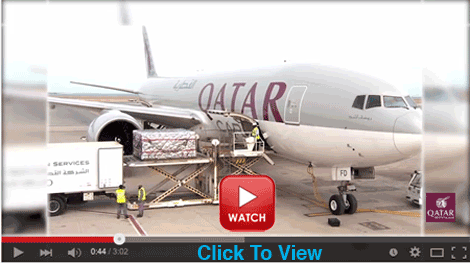 “Doha
has established itself as a global hub. The country
has invested in significant infrastructure projects
and aspires to become a world-recognized logistical
center with the development of free trade and logistics
zones expanding.
“Doha
has established itself as a global hub. The country
has invested in significant infrastructure projects
and aspires to become a world-recognized logistical
center with the development of free trade and logistics
zones expanding.
“The Middle East
is benefitting from the stability of traffic flows
from east to west and increased demand for perishable
products to the rapidly expanding consumer population
in the GCC countries. “Multiple
large construction projects as well as the oil and
gas industry in Qatar ensure heavy demand for import
flows. Qatar Airways Cargo is perfectly positioned
at the brand new Hamad International Airport with
its state-of-the-art facilities to capitalize on this.
“We also always
have to keep in mind that an important part of air
cargo service quality occurs on the ground. Managing
the export acceptance, the import delivery, and timely
transport of shipments each year is an operational
challenge. Therefore, we are constantly on the watch
for ways to improve our service and operational capabilities.
Qatar Airways Cargo has always had a strong vision,
helping it chart a clear path forward in a changing
market. This approach in tandem with continuous investments
in new technologies, automation, products, and services
as well as resources has enabled us to distinguish
our business and stay ahead despite volatile market
dynamics.”
Carrying
Pharma For Example
“We saw significant
growth in this area last year, and this is continuing
at an even faster rate in 2015. QR Pharma is now available
in 58 destinations worldwide and we have invested
heavily in infrastructure for time- and temperature-sensitive
goods. This is best demonstrated by our reefer vehicles,
which meet every flight in Doha, ensuring the cool
chain process is seamless and thereby eliminating
risk to temperature exposure.
“The pharmaceutical
industry is witnessing rapid growth every year, and
with rising demand there is the need to ensure that
pharmaceuticals and healthcare products are transported
with the utmost care while avoiding any temperature
fluctuations. Speed and temperature play a crucial
role in the transportation of these products and we
make sure that they are handled expertly throughout
their journey. We adhere to the IATA regulations for
carriage of pharmaceuticals.
“Innovation drives
new solutions. This year, the Va-Q-tec container technology
was introduced—a new QR Pharma advanced passive
transportation method that complements Qatar Airways
Cargo’s existing Envirotainer and CSafe active
containers to offer customers a flexible airfreight
solution.
“We’ve seen
a 150 percent increase in pharmaceutical tonnages
compared to last year.
“Our Pharma Express
routes provide dedicated uplift to the pharmaceutical
industry. This is unique. We are the only airline
in the world that offers dedicated scheduled flights
for pharmaceuticals.
“The main features
of this product at the hub are the use of reefer vehicles
on the ramp that collect and deliver directly to and
from the aircraft, totally eliminating ramp exposure—we
are the only carrier in the Middle East to offer this
service at our hub. Our pharma service incorporates
temperature-controlled handling and storage at the
HIA Cargo Terminal in the appropriate temperature
zones, 64 temperature-controlled cells for units requiring
precise temperature, the fastest airline transfer
at Doha through its Quick Ramp Transfer (QRT) solution,
and a dedicated climate control team.”
Geoffrey
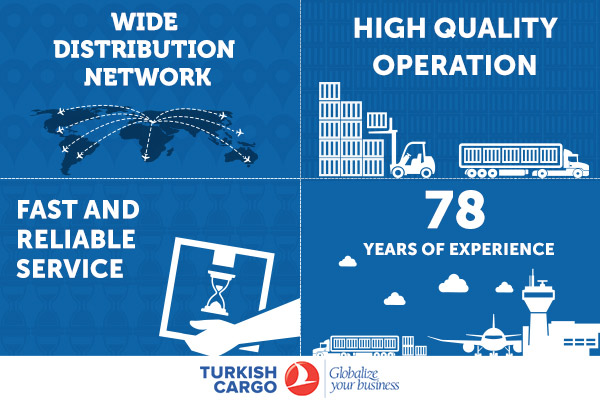
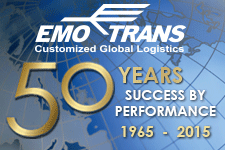


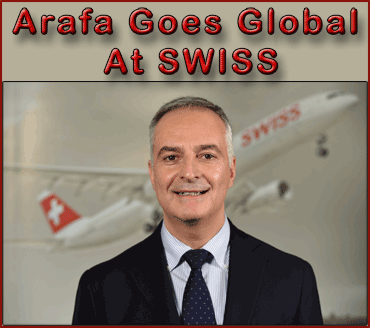
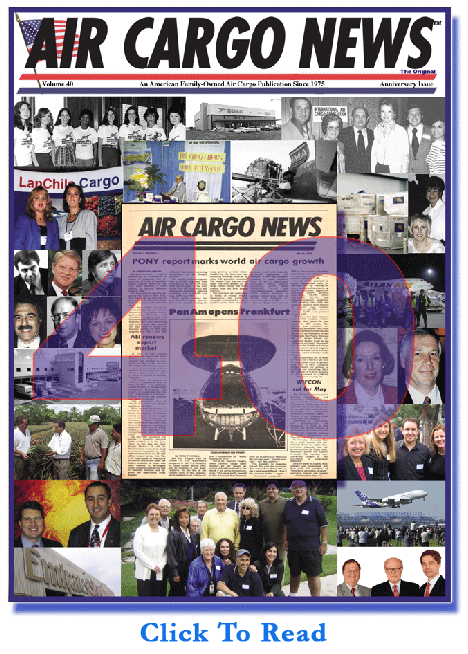

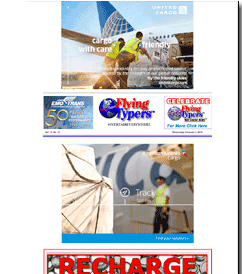
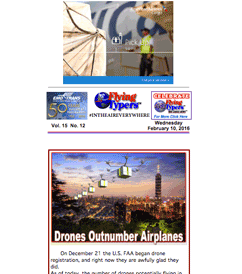

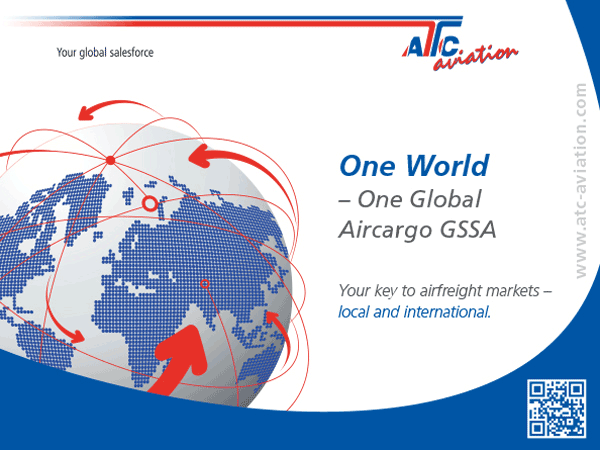

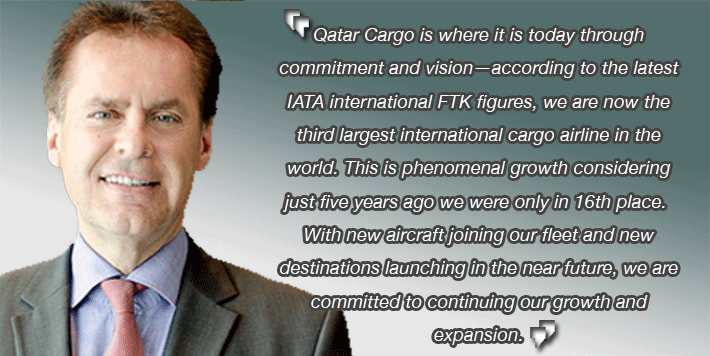

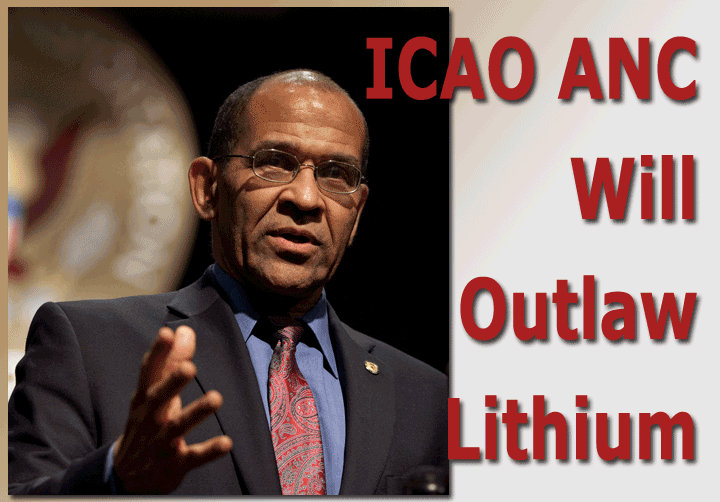
 RE:
RE:

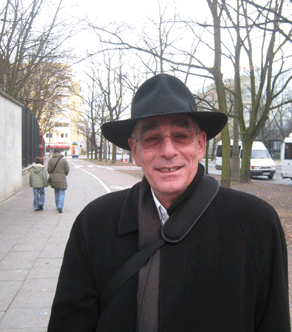 My
friend in Holland, Jos van der Woensel, is currently
in the fight of his life.
My
friend in Holland, Jos van der Woensel, is currently
in the fight of his life.